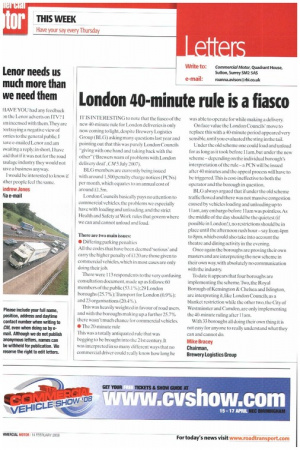London 40-minute rule is a fiasco
Page 18

If you've noticed an error in this article please click here to report it so we can fix it.
IT IS INTERESTING to note that the fiasco of the new 40-minute rule for London deliveries is only now coming to light, despite Brewery Logistics Group (BLG) asking many questions last year and pointing out that this was purely London Councils "giving with one hand and taking back with the other" (`Brewers warn of problems with London delivery deal', CM 5 July 2007).
BLG members are currently being issued with around 1,500 penalty charge notices (PCNs) per month, which equates to an annual cost of around £.1.5m.
London Councils basically pays no attention to commercial vehicles, the problems we especially have with loading and unloading, and the strict Health and Safety at Work rules that govern where we can and cannot unload and load.
There are two main issues:
• Differing parking penalties All the codes that have been deemed 'serious' and carry the higher penalty of £120 are those given to commercial vehicles, which in most cases are only doing their job.
There were 113 respondents to the very confusing consultation document, made up as follows: 60 members of the public (53.1% );29 London boroughs (25.7%);Transport for London (0.9%); and 23 organisations (20.4%).
This was heavily weighted in favour of road users, and with the boroughs making up a further 25.7% there wasn't much chance for commercial vehicles.
• The 20-minute rule This was a totally antiquated rule that was begging to be brought into the 21st century. It was interpreted in so many different ways that no commercial driver could really know how long he was able to operate for while making a delivery.
On face value the London Councils' move to replace this with a 40-minute period appeared very sensible, until you evaluated the sting in the tail.
Under the old scheme one could load and unload for as long as it took before Ilam, but under the new scheme —depending on the individual borough's interpretation of the rule —a PCN will be issued after 40 minutes and the appeal process will have to be triggered,This is cost-ineffective to both the operator and the borough in question.
BLG always argued that if under the old scheme traffic flowed and there was not massive congestion caused by vehicles loading and unloading up to I 1 am, any embargo before 1 1 am was pointless. As the middle of the day should be the quietest (if possible in London!), no restrictions should be in place until the afternoon rush hour —say from 4pm to Spm, which could also take into account the theatre and dining activity in the evening.
Once again the boroughs are proving their own masters and are interpreting the new scheme in their own way, with absolutely no communication with the industry To date it appears that four boroughs are implementing the scheme.T\vo, the Royal Borough of Kensington & Chelsea and Islington, are interpreting it, like London Councils, as a blanket restriction while the other two, the City of Westminster and Camden, are only implementing the 40-minute ruling after 11 am.
With 33 boroughs all doing their own thing it is not easy for anyone to really understand what they can and cannot do.
Mike Bracey Chairman,
Brewery Logistics Group
































































































































































